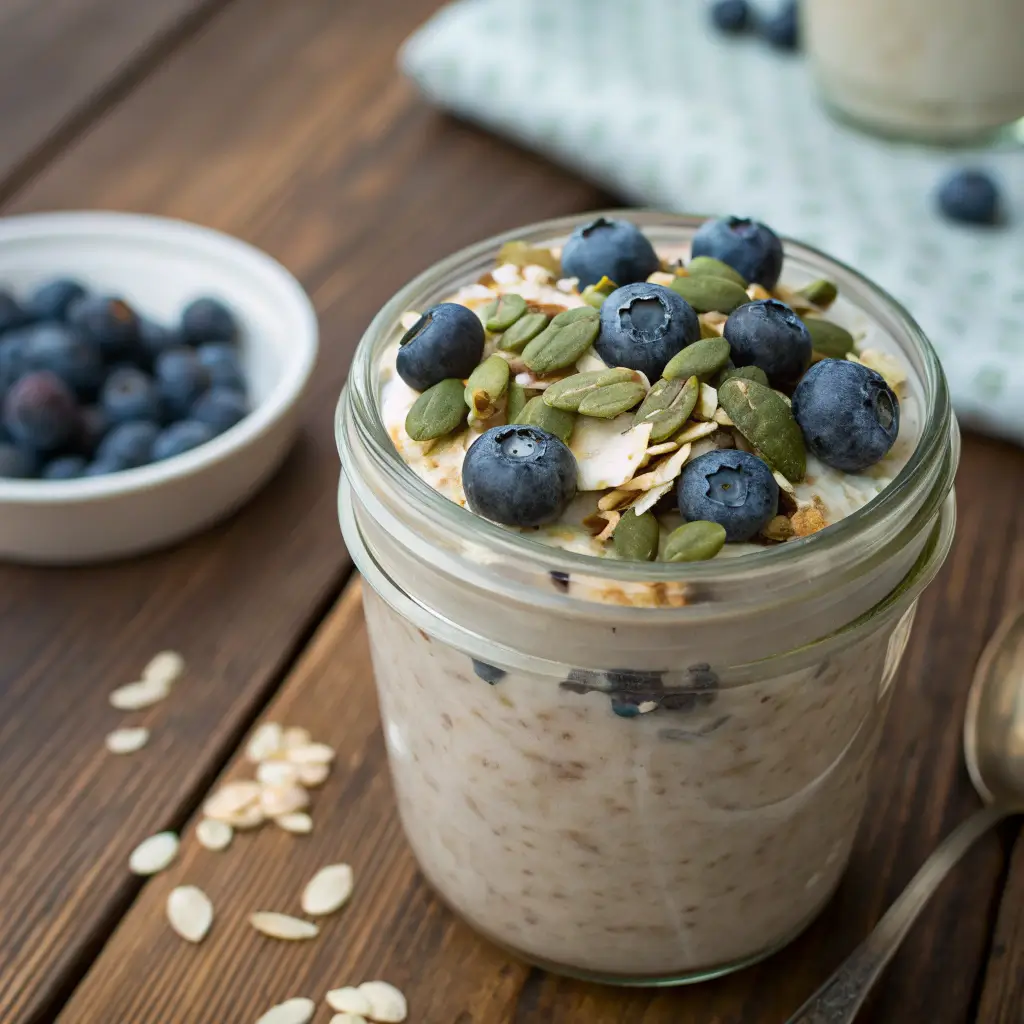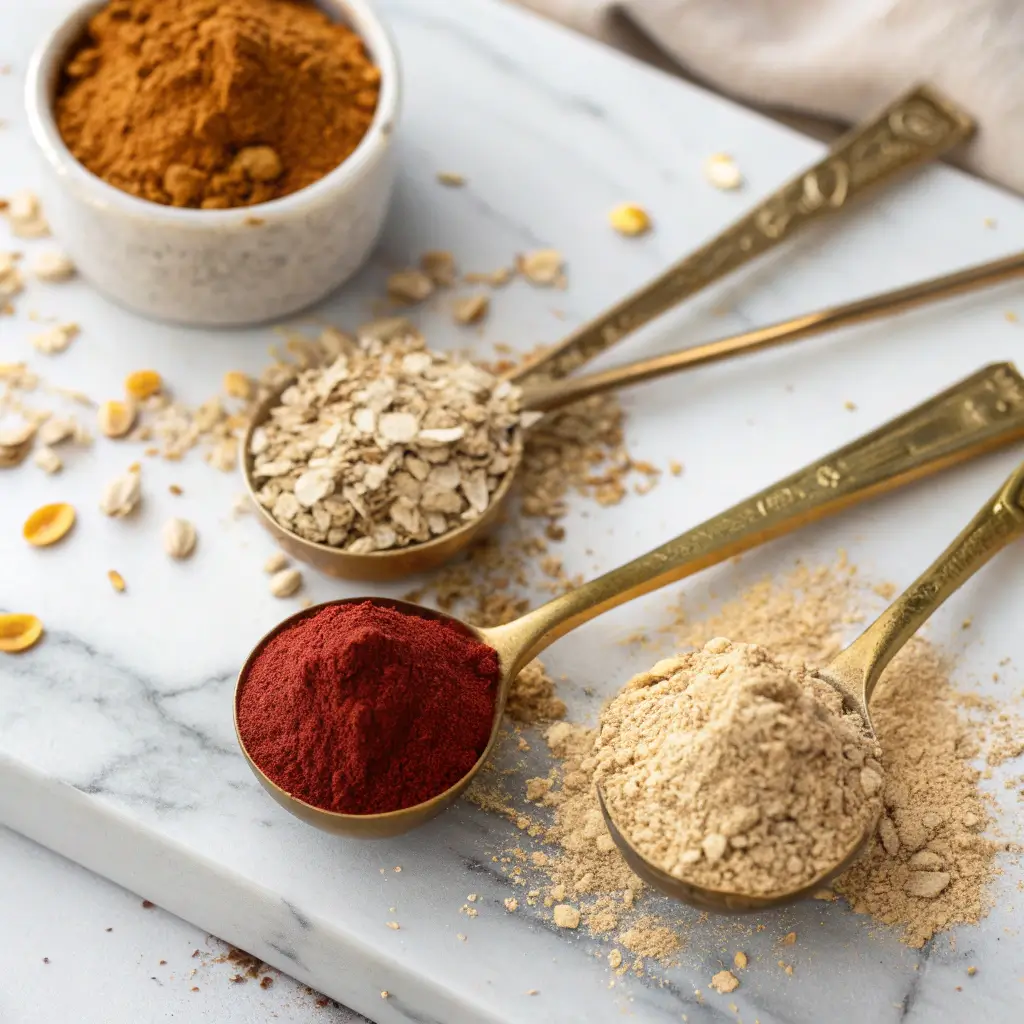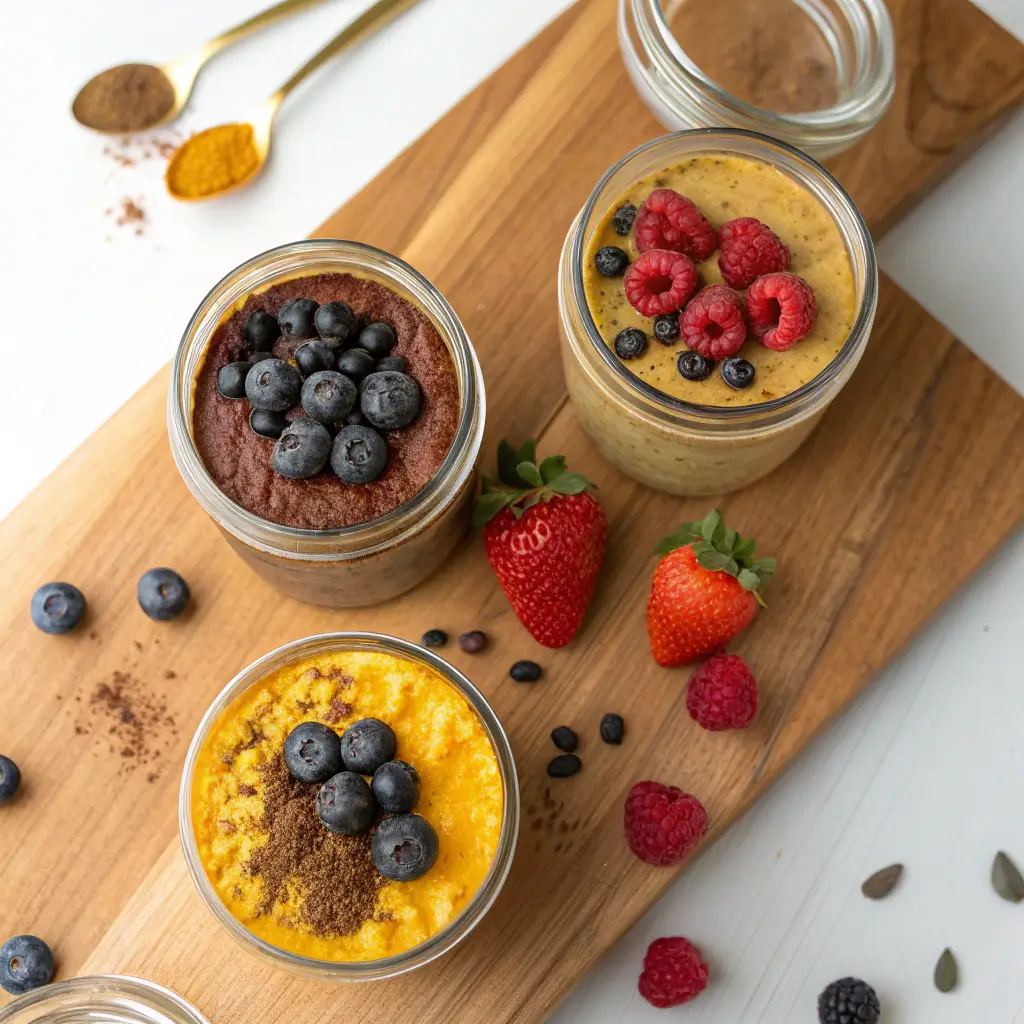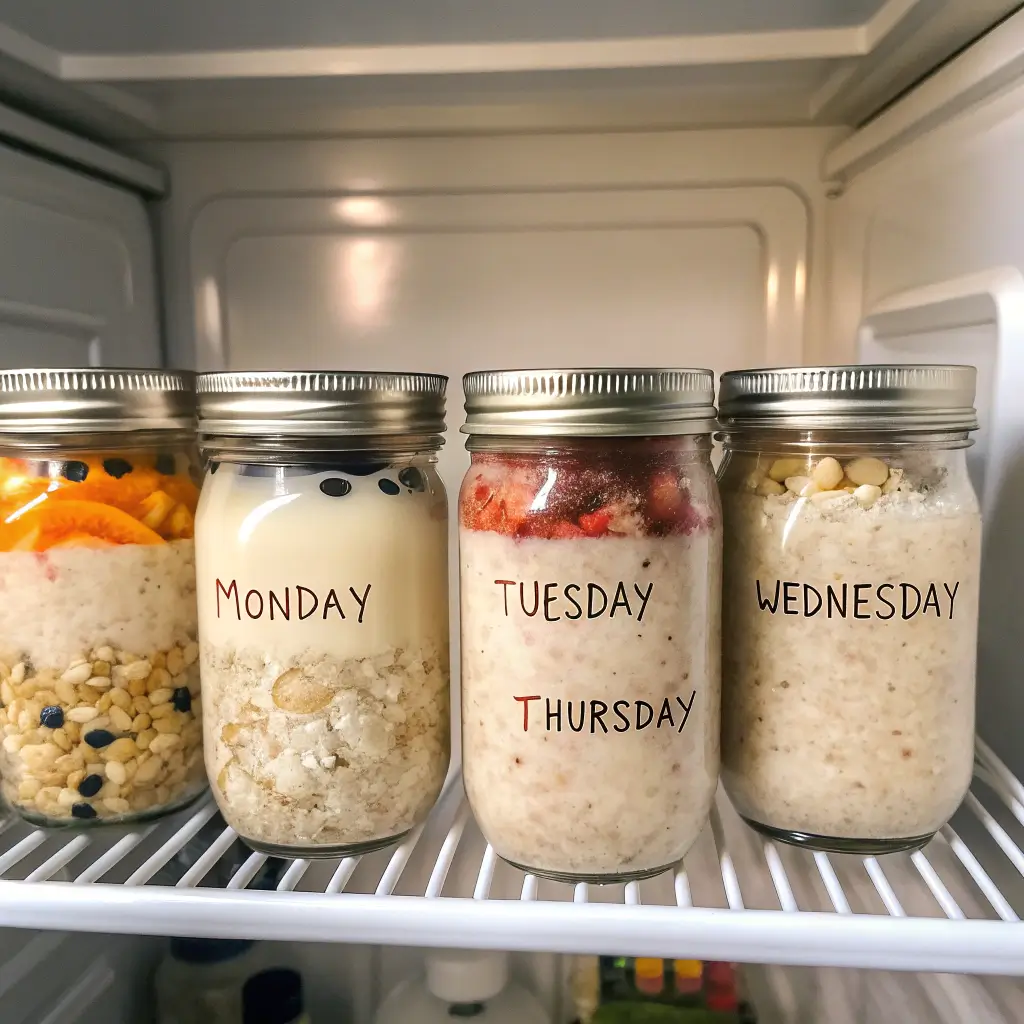Adaptogenic overnight oats are your new go-to breakfast for balancing stress, boosting energy, and nourishing your body—all before you’ve even had your morning coffee. This make-ahead meal is the perfect blend of traditional herbal wisdom and modern nutrition, combining the creamy comfort of oats with powerful adaptogens like ashwagandha and reishi.
If you’ve been feeling overwhelmed, tired, or simply in need of a new morning routine, adaptogenic overnight oats might be the answer. They’re not only delicious and easy to prep but also designed to support your mood, digestion, and immunity—all in one jar.
In this guide, we’ll explore what makes these oats so special, how to build your perfect bowl, and the best herbs to use depending on your needs. From classic combos to creative variations, you’ll walk away with everything you need to turn your breakfast into a stress-fighting ritual.

Check out High Protein Vegan Overnight Oats for another nutrient-rich option packed with morning benefits.
Discover great ideas like these probiotic overnight oats to combine gut-friendly benefits with your adaptogenic routine
Table of Contents
What Are Adaptogenic Overnight Oats?
Understanding Adaptogens: Nature’s Stress Busters
Adaptogens are herbs and natural substances that help your body adapt to stress, whether it’s physical, emotional, or environmental. Used for centuries in Ayurvedic and Chinese medicine, adaptogens like ashwagandha, reishi, and maca are now key players in the world of functional wellness.
These herbs don’t act like stimulants. Instead, they help bring your body back to balance by supporting your adrenal system and regulating cortisol levels. That’s why adaptogens are perfect additions to your morning meal—especially in something as comforting and customizable as oats.
What Makes Oats ‘Adaptogenic’?
On their own, oats are a breakfast superstar. They’re packed with heart-healthy beta-glucans, gut-friendly fiber, and slow-releasing carbohydrates to keep you full and fueled. But when you mix in adaptogens, you transform this humble grain into a functional food.
Adaptogenic overnight oats combine the digestibility of soaked oats with the healing power of adaptogens. These no-cook oats act as a carrier for herbal powders, allowing your body to absorb their benefits more effectively—especially when paired with fats like coconut milk or almond butter.
Whether you’re adding ashwagandha for energy, shatavari for hormonal balance, or reishi for immune support, these oats become more than breakfast—they become a self-care ritual.
Health Benefits of Adaptogenic Overnight Oats
Why Oats Are a Nutritional Powerhouse
There’s a reason oats have been a breakfast staple for centuries. They’re one of the most versatile, budget-friendly, and nutrient-dense grains out there. And when soaked overnight, they’re even easier to digest—making them the perfect base for your adaptogenic creations.
Here’s a quick glance at what makes oats so impressive:
| Nutrient | Benefits |
|---|---|
| Beta-glucan fiber | Helps lower cholesterol and support gut health |
| Magnesium | Supports muscle function, heart health, and relaxation |
| Iron | Essential for oxygen transport and energy |
| Zinc | Supports immune system and skin health |
| Protein | Sustains energy and supports muscle maintenance |
| Antioxidants | Help fight inflammation and oxidative stress |
Eating adaptogenic overnight oats regularly can help stabilize your blood sugar, curb cravings, and provide a steady stream of energy throughout the day. They’re especially beneficial for those trying to reduce processed carbs and add more plant-based meals into their diet.
Plus, oats are a natural prebiotic, meaning they feed the good bacteria in your gut. When your gut is happy, your hormones, brain function, and immunity all follow suit.
Top Adaptogenic Herbs and Their Health Benefits
Now here’s where the magic really happens—adding adaptogens to your oats transforms them into a functional wellness meal. Each adaptogen brings something unique to the table, and you can tailor your oats depending on how you’re feeling or what your body needs.
Let’s break down some of the most popular adaptogens found in adaptogenic overnight oats:
| Adaptogen | Main Benefits | Best Time to Use |
|---|---|---|
| Ashwagandha | Calms the nervous system, supports mood and thyroid | Morning or evening |
| Reishi | Boosts immunity, supports liver detox, anti-anxiety | Morning or night |
| Shatavari | Hormone balance, fertility support, cooling for the body | Morning |
| Maca | Energy booster, hormone stabilizer, improves libido | Morning only |
| Holy Basil (Tulsi) | Stress resilience, mental clarity, immunity | Anytime |
| Cordyceps | Physical performance, respiratory support, stamina | Pre-workout or morning |
| Astragalus | Strengthens immune system, supports adrenal glands | Morning |
What’s beautiful about adaptogenic overnight oats is that you don’t need to overdo it. A small amount of herbal powder—usually 1/2 to 1 tsp—is all it takes to infuse your breakfast with benefits. And when you prep them with full-fat plant-based milk (like coconut or almond milk), you help extract the fat-soluble compounds in the herbs, making them more bioavailable.
If you’re looking to deepen your routine with wellness-forward ingredients, this is a tasty, accessible way to do it.
Discover great ideas like Healthy Chocolate Overnight Oats to spice up your adaptogenic rotation with a rich, antioxidant-packed twist.
Key Ingredients for Making Adaptogenic Overnight Oats
Best Types of Oats: Steel Cut vs Rolled vs Quick Oats
When building the perfect adaptogenic overnight oats, your first step is picking the right kind of oats. Different oats yield different textures, soak times, and flavor profiles, all of which affect how well your adaptogens blend into the final result.

Let’s break it down:
| Oat Type | Texture | Soaking Time | Perfect For |
|---|---|---|---|
| Steel Cut Oats | Hearty and chewy | 10–12 hours | High-fiber lovers & meal preppers |
| Rolled (Old-Fashioned) | Creamy and soft | 6–8 hours | Classic, balanced, and versatile |
| Quick Oats | Soft and smooth | 2–4 hours | Fast prep, softer texture, easy blends |
For most adaptogenic overnight oats, rolled oats offer the best balance of creaminess and structure. They soak well, hold adaptogenic powders evenly, and are easy to digest. Steel-cut oats bring a chewy bite and take longer to soften, but they’re great if you enjoy a more rustic texture. Quick oats are convenient but can turn mushy if left too long.
The key here is to avoid pre-sweetened or instant oat packs. Always choose organic, plain oats as your base to keep your adaptogenic overnight oats clean and nutrient-rich.
Top Adaptogens to Use in Adaptogenic Overnight Oats
This is where your oats go from basic to brilliant. Adaptogens bring targeted health benefits—whether it’s reducing anxiety, increasing energy, or supporting your immune system. Adding these to your adaptogenic overnight oats turns a regular breakfast into a nourishing ritual.
Here are some popular adaptogens and how they enhance your oats:
- Ashwagandha: A star ingredient in most adaptogenic overnight oats recipes, this calming root helps manage cortisol and stress. Its slightly earthy flavor blends well with cinnamon, vanilla, or maple.
- Reishi Mushroom: Ideal for immune and sleep support. Pairs beautifully with cacao or dark cherries in overnight oat blends.
- Shatavari: Especially beneficial for hormone balance. Mild and pleasant in both fruity and spiced oat combinations.
- Maca Root: Great for morning energy and endurance. Its nutty taste works well with bananas, almond butter, and chia seeds.
- Astragalus & Holy Basil (Tulsi): These herbs strengthen the immune system and promote emotional balance. Light and herbaceous—perfect for citrus or pear-based oats.
- Cordyceps: Enhances stamina and focus. Great with espresso oats or mocha-inspired combinations.
To get the full benefit, use 1/2 to 1 teaspoon per serving, and mix your adaptogens into the liquid before adding the oats. That helps activate the herbs and blend them more evenly into the mix. Using plant-based milk like coconut or cashew milk also supports nutrient absorption, especially for fat-soluble compounds in herbs like ashwagandha or reishi.
For added creaminess, mix in yogurt or chia seeds. To sweeten, go with natural options like maple syrup, raw honey, or mashed fruit.
Discover great ideas like Creamy Overnight Oats with Protein Powder to see how creamy textures support herbal infusions.
Check out these nootropic morning oats for a brain-boosting breakfast that complements your adaptogens
How to Make Adaptogenic Overnight Oats – Step-by-Step Guide
Foundational Recipe with Ashwagandha and Coconut Milk
Making adaptogenic overnight oats is incredibly simple—and totally customizable. All you need is a jar, a spoon, and a few nutrient-packed ingredients. The best part? You prep everything the night before, and breakfast is ready by morning.
Here’s a go-to foundational recipe using one of the most popular adaptogens: ashwagandha.
Basic Adaptogenic Overnight Oats Recipe
| Ingredient | Amount |
|---|---|
| Rolled oats | 1/2 cup |
| Unsweetened coconut milk | 3/4 cup (or any plant milk) |
| Ashwagandha powder | 1 tsp |
| Cinnamon powder | 1/2 tsp |
| Nutmeg (optional) | 1/4 tsp |
| Maple syrup or honey | 1 tbsp |
| Sea salt | A small pinch |
| Chia seeds or ground flax (optional) | 1 tbsp |
| Fresh/frozen fruit for topping | Your choice |
| Pumpkin seeds or nuts (optional) | 1–2 tbsp |
Instructions:
- In a jar or bowl, combine oats, adaptogens, cinnamon, and sea salt.
- Add the coconut milk and sweetener, then stir well to combine. Make sure the adaptogenic powder dissolves smoothly.
- Mix in chia seeds if using—they’ll add texture and boost omega-3s.
- Cover and refrigerate overnight (6–12 hours).
- In the morning, stir again and top with your favorite fruit, nuts, seeds, or even extra adaptogens.
These adaptogenic overnight oats are creamy, comforting, and packed with flavor. Ashwagandha provides grounding energy without jitters, while coconut milk helps extract its fat-soluble benefits.
Flavor Boosters: Fruits, Nuts, Seeds, Spices, and Sweeteners
The beauty of adaptogenic overnight oats lies in the endless ways to dress them up. Want something energizing? Go with maca, banana, and almond butter. Need calm and clarity? Try reishi, cacao, and berries. Here’s how to keep your oats exciting every morning.
Fruits to Mix In or Top With
- Blueberries, strawberries, or raspberries
- Chopped apples or pears
- Bananas or persimmons
- Cherries, cranberries, or raisins
- Coconut flakes or dried mango
Seeds & Nuts
- Pumpkin seeds (great with ashwagandha)
- Sunflower or sesame seeds
- Hemp hearts or chia seeds
- Walnuts, almonds, cashews
Herbal Powder Pairings
| Adaptogen | Best Flavor Combos |
|---|---|
| Ashwagandha | Cinnamon, coconut, banana |
| Reishi | Cacao, almond milk, maple |
| Maca | Almond butter, dates, vanilla |
| Shatavari | Blueberries, rose, honey |
Natural Sweeteners
- Maple syrup
- Raw honey
- Mashed ripe banana
- Medjool dates
- Coconut nectar
Make sure every mix includes a fat (like nut butter, coconut milk, or yogurt) to help your body absorb the adaptogens fully.
Don’t miss our Chocolate Peanut Butter Overnight Oats if you’re craving something decadent that still fits your wellness routine.
Adaptogenic Overnight Oats for Specific Wellness Goals
Adaptogenic overnight oats are more than a convenient breakfast—they’re a personalized wellness ritual. Depending on the adaptogens and add-ins you choose, your oats can target stress, fatigue, hormonal imbalance, sleep, or even immune support. It’s like having your own herbalist-crafted meal in a jar.
Below are some powerful goal-based combos to inspire your daily mix.
For Stress Relief and Energy Balance
If you’re waking up feeling groggy or anxious, build your oats with ashwagandha, one of the most researched calming adaptogens. It’s known to reduce cortisol, support adrenal health, and ease mental fatigue—making it a great fit for morning calm and sustained energy.
Stress-Busting Adaptogenic Overnight Oats Combo:
- Rolled oats
- Coconut milk (full-fat for absorption)
- 1 tsp ashwagandha powder
- 1 tbsp almond butter
- 1/2 tsp cinnamon
- 1 tbsp chia seeds
- Sliced banana or apple for sweetness
Add a touch of maple syrup and top with walnuts for brain-supporting omega-3s.
This blend helps create a feeling of grounded focus—perfect before a busy day or demanding schedule.
For Hormonal Support, Immunity, and Sleep
Looking for a more supportive blend for your cycle, immune system, or restful nights? Enter: shatavari, reishi, and maca—adaptogens that nurture the endocrine and immune systems while promoting deeper rest and inner balance.
Hormone & Immune-Support Adaptogenic Oats:
- Rolled or steel-cut oats
- Cashew milk or oat milk
- 1/2 tsp shatavari powder
- 1/2 tsp reishi powder
- 1 tsp raw honey or mashed dates
- Cardamom and nutmeg (for warmth)
- Blueberries or blackberries
Top with pumpkin seeds for added zinc—a key mineral in hormone production and immunity.
Reishi is especially great for evening oats (yes, overnight oats can also be an evening snack!) because it promotes deep, restorative sleep. Add a splash of vanilla extract to round out the flavors.
Customize Your Adaptogenic Overnight Oats by Goal
| Wellness Goal | Adaptogens to Use | Recommended Add-Ins |
|---|---|---|
| Stress & Anxiety | Ashwagandha, Holy Basil | Banana, cinnamon, almond butter |
| Hormonal Balance | Shatavari, Maca | Berries, flax, pumpkin seeds |
| Immune Support | Reishi, Astragalus | Ginger, honey, blueberries |
| Sleep & Calm | Reishi, Ashwagandha | Nutmeg, warm spices, coconut milk |
| Physical Stamina | Cordyceps, Maca | Coffee oats, cacao nibs, cashews |
With just a few tweaks, your adaptogenic overnight oats can work in harmony with your body’s needs. That’s the magic of these herbal-powered bowls—they’re flexible, functional, and deeply supportive.
Looking for inspiration? Try Greek Yogurt Overnight Oats for a high-protein base that pairs beautifully with hormonal and immune-boosting adaptogens.
Tasty Variations to Try with Adaptogenic Overnight Oats
Tired of the same old oats every morning? Good news—adaptogenic overnight oats are endlessly customizable. Whether you’re in the mood for rich chocolate, cozy chai, or tropical vibes, there’s a blend to match your cravings and your wellness goals. This section is all about experimenting with flavor while sneaking in your daily adaptogens.

Chocolate Reishi Oats (for Deep Calm)
This rich, earthy combination is perfect when you want something comforting and indulgent—without the sugar crash. Reishi, known as the “queen of mushrooms,” pairs beautifully with raw cacao for a nighttime-friendly or stress-relieving breakfast.
Ingredients:
- Rolled oats
- Oat or almond milk
- 1 tsp reishi powder
- 1 tbsp cacao powder
- 1 tbsp maple syrup
- 1 tbsp chia seeds
- Dash of sea salt
- Optional: dark chocolate chips or coconut flakes
Why it works: Cacao and reishi are both antioxidant-rich, and reishi’s calming effects make this version ideal for days when you need extra balance.
Golden Turmeric Adaptogenic Oats (for Inflammation Support)
A warm, soothing blend that’s anti-inflammatory, immune-boosting, and great for digestion.
Ingredients:
- Rolled oats
- Coconut or cashew milk
- 1/2 tsp turmeric
- 1/2 tsp ashwagandha powder
- Pinch of black pepper (for absorption)
- 1/2 tsp cinnamon
- Honey or date syrup to sweeten
- Optional: slivered almonds and dried apricots
Pro Tip: The black pepper and fat from coconut milk help activate curcumin in turmeric, making this variation as effective as it is delicious.
Berry Maca Energy Oats (for Hormone and Stamina Support)
This fruity, energizing combo is perfect for busy mornings when you need a brain and body boost.
Ingredients:
- Rolled oats
- Almond or hemp milk
- 1 tsp maca powder
- 1/2 tsp vanilla extract
- Mixed berries (fresh or frozen)
- Almond butter drizzle
- Optional: flaxseed or hemp hearts
Maca adds a subtle caramel flavor and is especially great for supporting hormone health and libido.
Chai-Spiced Shatavari Oats (for Women’s Wellness)
Inspired by traditional Ayurvedic blends, this variation is warming, grounding, and perfect during times of hormonal fluctuation.
Ingredients:
- Rolled oats
- Cashew milk
- 1 tsp shatavari powder
- 1/2 tsp chai spice or mix of cinnamon, ginger, cardamom
- 1 tsp maple syrup or honey
- Optional: raisins and pistachios
This bowl is calming and supportive—especially comforting during your cycle or stressful weeks.
Flavor Ideas to Try in Your Adaptogenic Overnight Oats
| Flavor Theme | Adaptogens | Flavor Add-Ins |
|---|---|---|
| Chocolate Mocha Calm | Reishi + Cacao | Espresso, almond milk, cacao nibs |
| Caramel Banana Boost | Maca + Ashwagandha | Banana, cinnamon, almond butter |
| Immune Defense Blend | Reishi + Astragalus | Ginger, lemon zest, raw honey |
| Hormone Happy Bowl | Shatavari + Maca | Blueberries, flax, rose petals |
| Bedtime Bliss Bowl | Ashwagandha + Nutmeg | Warm spices, coconut milk, vanilla |
No matter which direction you go, your adaptogenic overnight oats can become a fun, nourishing experience that never gets boring.
Looking for another protein-packed variation? Try High Protein Overnight Oats for Weight Loss to keep your macros in check while boosting energy and recovery.
Meal Prep and Storage Tips
One of the biggest advantages of adaptogenic overnight oats is how easily they fit into a busy lifestyle. With just a few minutes of prep the night before—or even a full week in advance—you’ll always have a nourishing, stress-busting breakfast ready to go. Here’s how to meal prep your oats like a pro.

How to Store and Refrigerate Overnight Oats Properly
Whether you’re making a single serving or prepping five jars for the workweek, storage matters. Proper refrigeration keeps your adaptogenic overnight oats fresh, safe to eat, and at peak flavor.
Storage Best Practices:
- Use sealed, airtight containers like mason jars or reusable glass containers.
- Refrigerate immediately after mixing to prevent spoilage.
- Label jars by day or flavor if prepping multiple varieties to keep things organized.
- Consume within 4–5 days for best taste and texture. Oats will soften more over time, so the texture changes slightly each day.
Here’s a quick storage guide:
| Prep Day | Consume By |
|---|---|
| Sunday | Thursday |
| Monday | Friday |
| Tuesday | Saturday |
Pro Tip: If you’re using fruit like bananas or apples, add them the night before eating to prevent browning and sogginess.
Batch Prep for the Week Without Losing Freshness
Want to prep multiple jars of adaptogenic overnight oats without sacrificing quality? The key is layering and knowing when to add certain ingredients.
Layering Strategy for Meal Prep:
- Dry ingredients first: oats, adaptogenic powders, spices, seeds.
- Then add liquid: milk, yogurt, or a mix of both.
- Add sweeteners and nut butter next: maple syrup, almond butter, etc.
- Top with fruit last (or wait until serving day).
This method keeps the oats from getting too soggy or bland. By separating fruits and wet toppings until just before eating, you preserve texture and freshness.
Freezing Overnight Oats?
Yes, you can freeze adaptogenic overnight oats, but with some limitations:
- Use freezer-safe jars.
- Leave space at the top for expansion.
- Don’t add fruit or chia until thawing.
- Thaw in the fridge overnight before eating.
Freezing is great for long-term planning but might slightly affect texture.
Explore more :
Here are some similar recipes related to gut brain overnight oats :
| probiotic overnight oats |
| Prebiotics and Probiotics for Digestive Health |
| magnesium overnight oats |
| nootropic morning oats |
| fermented oats recipe |
| electrolyte overnight oats |
Expert Tips to Maximize Nutrient Absorption
Sure, tossing a scoop of ashwagandha into your oats is a solid start—but what if you could unlock more from your ingredients? With a few intentional tweaks, you can seriously boost how your body processes the adaptogens and nutrients in your adaptogenic overnight oats.
Let’s break down how to upgrade your bowl for peak bioavailability.
Why You Should Soak Your Oats and Use Lipid Extraction
Soaking oats isn’t just about soft texture—it actually enhances their digestibility and nutritional value. Raw oats contain phytic acid, a natural compound that can interfere with the absorption of key minerals like iron, zinc, and magnesium. When you soak your oats overnight, you help break down that acid and improve nutrient availability.
Here’s where it gets even better: many adaptogens are fat-soluble, meaning your body needs a healthy fat source to fully absorb their active compounds. This is especially true for:
- Ashwagandha
- Reishi
- Shatavari
- Turmeric
This process is known as lipid extraction. When you mix adaptogens into a milk like coconut milk or almond milk—both high in healthy fats—you’re essentially unlocking more of their therapeutic benefits.
Pro Tip:
Use a full-fat plant milk (like coconut or cashew milk), or stir in nut butter or ghee. This not only adds creaminess, it actually enhances the herbal action of your adaptogenic overnight oats.
Pairing Adaptogens with the Right Liquids and Fats
If you’re going to use powerful herbs in your breakfast, make sure they’re paired with the right companions. Not all adaptogens absorb equally, and some benefit from specific partners to increase their impact.
| Adaptogen | Best Carrier Liquid | Supporting Ingredients |
|---|---|---|
| Ashwagandha | Coconut milk | Cinnamon, ghee, almond butter |
| Reishi | Oat milk or almond milk | Cacao, vanilla, maple syrup |
| Maca | Cashew milk | Banana, peanut butter, chia |
| Shatavari | Flax milk | Rose, cardamom, berries |
| Cordyceps | Hemp milk or oat milk | Espresso, dark chocolate, oats |
Adding a small amount of black pepper when using turmeric or adaptogens high in curcumin also increases absorption due to the compound piperine.
Don’t Forget to Chew (Even Cold Oats)
Yes, you still need to chew your adaptogenic overnight oats. Digestion begins in the mouth, and chewing stimulates enzymes that break down carbohydrates and help absorb minerals. Even though overnight oats are soft and cold, chewing thoroughly supports gut health and nutrient delivery.
Learn more about How Much Protein Is in Overnight Oats? to further optimize your morning macros and keep those energy levels stable.
Common Mistakes to Avoid When Making Adaptogenic Overnight Oats
Adaptogenic overnight oats might seem foolproof—and for the most part, they are. But even this superfood-packed breakfast has its quirks. A few small missteps can affect taste, texture, and even how effective your adaptogens are.
Let’s look at some common mistakes and how to fix them so every jar you make is as functional as it is flavorful.
Mistake #1: Overloading on Adaptogenic Powders
More isn’t always better—especially with herbs. A little goes a long way, and adding too much can overwhelm your oats with bitterness, strange textures, or even cause unwanted side effects.
Fix It:
Stick to 1/2 to 1 teaspoon per serving of any single adaptogen. Want to combine more than one? Keep the total amount to about 1 teaspoon max. Rotate herbs by day or week to give your body time to adjust.
Mistake #2: Skipping Healthy Fats
Many adaptogens—like ashwagandha, turmeric, and reishi—need fat to be properly absorbed. Skipping fats in your adaptogenic overnight oats means you might not get the full wellness benefits you’re looking for.
Fix It:
Use full-fat plant-based milk (like coconut or cashew), add nut butters, or mix in seeds like flax or chia. These not only improve absorption, but also make your oats creamy and satisfying.
Mistake #3: Choosing Poor-Quality Adaptogens
Not all powders are created equal. Some cheap or poorly sourced adaptogens may contain fillers, additives, or lack potency altogether—leaving your oats looking good, but lacking real power.
Fix It:
Buy your adaptogens from trusted herbal suppliers. Look for organic, sustainably harvested, and 3rd-party tested herbs. Mountain Rose Herbs, Gaia Herbs, and Sun Potion are good places to start.
Mistake #4: Not Adjusting Flavors Around the Herbs
Some adaptogens (like reishi or astragalus) have a strong earthy or bitter flavor. If you don’t balance them with the right spices or sweeteners, your oats might taste more like medicine than breakfast.
Fix It:
Pair bitter herbs with cacao, cinnamon, nutmeg, vanilla, or fruit. Natural sweeteners like maple syrup or mashed banana can mellow strong flavors while keeping things healthy.
Mistake #5: Letting Them Sit Too Long
Adaptogenic overnight oats are best enjoyed within 4–5 days. After that, they lose texture and freshness. Leaving fruit in too long can also make your oats soggy or ferment-y.
Fix It:
Prep no more than 3–4 servings at a time. Keep fresh fruits and delicate toppings (like coconut flakes or berries) separate until just before serving.
By avoiding these easy-to-make mistakes, your adaptogenic overnight oats will be consistently delicious, nutritious, and effective. A little attention to detail goes a long way in making this breakfast your daily ritual of self-care.
FAQs About Adaptogenic Overnight Oats
What are the best adaptogens to add to overnight oats?
The best adaptogens for overnight oats include ashwagandha, reishi mushroom, maca root, shatavari, and holy basil (tulsi). Each offers unique benefits—ashwagandha calms stress, reishi supports immunity, and maca boosts energy. Start with 1/2 to 1 teaspoon per serving. These herbs mix well into the creamy base of adaptogenic overnight oats, especially when paired with warming spices or nut butters.
Can I eat adaptogenic overnight oats every day?
Yes, you can enjoy adaptogenic overnight oats daily—especially when rotating your adaptogens. Most herbalists recommend using 1–2 adaptogens at a time and alternating every few weeks. This helps avoid over-reliance on any single herb and keeps your body responsive to their effects. As with any wellness routine, listen to your body and adjust as needed.
Do adaptogens lose their potency in cold oats?
Not necessarily. Most powdered adaptogens maintain their benefits in cold preparations like overnight oats, especially when combined with healthy fats like coconut or almond milk. In fact, soaking herbs overnight in liquid can enhance bioavailability. For more potent herbs like reishi, you might use hot infusions occasionally for deeper support, but adaptogenic overnight oats remain a convenient and effective method for daily use.
What’s the best milk to use for adaptogenic oats?
The best milk for adaptogenic overnight oats is full-fat plant-based milk—such as coconut milk, cashew milk, or almond milk. These milks not only provide creaminess but also aid in the absorption of fat-soluble adaptogens like ashwagandha, turmeric, and reishi. Hemp and oat milk also work well for lighter options.
Are adaptogenic oats safe for kids?
Some adaptogens are safe for kids in small amounts, but not all. Gentle herbs like maca and holy basil are often used safely in family-friendly recipes. However, stronger adaptogens like ashwagandha or reishi should be used cautiously and under guidance from a pediatric herbalist. Always consult your healthcare provider before introducing adaptogenic overnight oats to children’s diets.
How long do adaptogenic oats last in the fridge?
Adaptogenic overnight oats can last up to 4–5 days in the fridge when stored in an airtight container. To keep them tasting fresh, store toppings like fruit or seeds separately and add just before serving. If using milk with shorter shelf life (like homemade almond milk), consume within 3 days.
Conclusion
When it comes to building a better morning routine, adaptogenic overnight oats check all the boxes—they’re easy, energizing, and deeply nourishing. By blending ancient herbal wisdom with modern nutrition, this simple breakfast transforms into a powerful tool for supporting stress, hormones, immunity, and more.
From calming ashwagandha blends to energizing maca bowls, the possibilities are endless. And whether you’re prepping one jar or a full week ahead, you’re feeding both body and mind with every bite.
Looking for more ways to balance flavor and function? Try High Protein Vegan Overnight Oats or Healthy Chocolate Overnight Oats to keep things fresh in your wellness rotation.
👉 Follow us for more wellness breakfast ideas:
